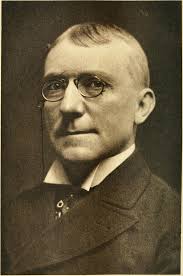Armazindy Page #12
James Whitcomb Riley poems book published in the 1894 book Armazindy and received very negative reviews that referred to poems like "The Little Dog-Woggy" and "Jargon-Jingle" as "drivel" and to Riley as a "worn out genius". Most of his growing number of critics suggested that he ignored the quality of the poems for the sake of making money.
“Yes—sir, Tudens!” broke in Mr. Twiggs at last, lighting a fresh churchwarden and settling into his old position at the grate; “have your laugh out over it now, but it’s a werry serious fact, for all that.” “I know it, Father,” said the girl, recovering her gravity, turning her large eyes lovingly upon him and speaking very tenderly. “I know it—oh, I know it; and many, many times when I have thought of it, and then again of your old kindly faith; all the warm wealth of your love; and our old home here, and all the happiness it ever held for me and you alike—oh, I have tried hard—indeed, indeed I have—to put all other thought away and live for you alone! But, Pop’m! dear old Pop’m—”And even as the great strong breast made shelter for her own, the woman’s heart within her flowed away in mists of gracious tears. “Couldn’t live without old Pop’m, could her?” half cried and laughed the happy Mr. Twiggs, tangling his clumsy fingers in the long dark hair that fell across his arm, and bending till his glad face touched her own.—“Couldn’t live without old Pop’m?” “Never! never!” sobbed the girl, lifting her brimming eyes and gazing in the kind old face. “Oh, may I always live with you, Pop’m? Always?—Forever?—” “—And a day!” said Mr. Twiggs, emphatically. “Even after I’m—” and she hid her face again. “Even after—what, Tudens?” “After I’m—after I’m—married?” murmured Tudens, with a longing pressure. “Nothink short!” said Mr. Twiggs;—“perwidin’,” he added, releasing one hand and smoothing back his scanty hair—“perwidin’, of course, that your man is a’ honest, straitforrerd feller, as ain’t no lordly notions nor nothink o’ that sort.” “Nor rich?” “Well, I ain’t so p’ticklar about his bein’ pore, adzackly.—Say a feller as works for his livin’, and knows how to ’usband his earnin’s thrifty-like, and allus ’as a hextry crown or two laid up against a rainy day—and a good perwider, of course,” said Mr. Twiggs, with a comfortable glance around the room.—“’Ll blow me if I didn’t see a face there a-peerin’ in the winder!” “Oh, no, you didn’t,” said the girl, without raising her head. “Go on—‘and a good provider—’” “—A good perwider,” continued Mr. Twiggs; “and a feller, of course, as has a’ eye out for the substantials of this life, and ain’t afeard o’ work—that’s the idear! that’s the idear!” said Mr. Twiggs, by way of sweeping conclusion. “And that’s all old Pop’m asks, after all?” queried the girl, with her radiant face wistful as his own. “W’y, certainly!” said Mr. Twiggs, with heartiness. “Ain’t that all and everythink to make home happy?”—catching her face between his great brown hands and kissing her triumphantly. “Hooray for Twiggs-and Twiggs-and Twiggs-and—” cootered the drowsy bird, disjointedly. The girl had risen.—“And you’ll forgive me for marrying such a man?” “Won’t I?” said Mr. Twiggs, with a rapturous twinkle. As he spoke, she flung her arms about his neck and pressed her lips close, close against his cheek, her own glad face now fronting the little window.... She heard the clicking of the latch, the opening of the door, and the step of the intruder ere she loosed her hold. “God bless you, Pop’m, and forgive me!—This is my husband.” The newcomer, Mr. Stanley, reached and grasped the hand of Mr. Twiggs, eagerly, fervidly, albeit the face he looked on then will haunt him to the hour of his death.—Yet haply, some day, when the Master takes the selfsame hand within his own and whispers, “Tude’s come home,” the old smile will return. DOLORES Lithe-armed, and with satin-soft shoulders As white as the cream-crested wave; With a gaze dazing every beholder’s, She holds every gazer a slave: Her hair, a fair haze, is outfloated And flared in the air like a flame; Bare-breasted, bare-browed and bare-throated— Too smooth for the soothliest name. She wiles you with wine, and wrings for you Ripe juices of citron and grape; She lifts up her lute and sings for you Till the soul of you seeks no escape; And you revel and reel with mad laughter, And fall at her feet, at her beck, And the scar of her sandal thereafter You wear like a gyve round your neck. WHEN I DO MOCK When I do mock the blackness of the night With my despair—outweep the very dews And wash my wan cheeks stark of all delight, Denying every counsel of dear use In mine embittered state; with infinite Perversity, mine eyes drink in no sight Of pleasance that nor moon nor stars refuse In silver largess and gold twinklings bright;— I question me what mannered brain is mine That it doth trick me of the very food It panteth for—the very meat and wine That yet should plump my starved soul with good And comfortable plethora of ease, That I might drowse away such rhymes as these. MY MARY My Mary, O my Mary! The simmer skies are blue: The dawnin’ brings the dazzle, An’ the gloamin’ brings the dew,— The mirk o’ nicht the glory O’ the moon, an’ kindles, too, The stars that shift aboon the lift.— But naething brings me you! Where is it, O my Mary, Ye are biding a’ the while? I ha’ wended by your window— I ha’ waited by the stile, An’ up an’ down the river I ha’ won for mony a mile, Yet never found, adrift or drown’d, Your lang-belated smile. Is it forgot, my Mary, How glad we used to be?— The simmer-time when bonny bloomed The auld trysting-tree,— How there I carved the name for you, An’ you the name for me; An’ the gloamin’ kenned it only When we kissed sae tenderly. Speek ance to me, my Mary!— But whisper in my ear As light as ony sleeper’s breath, An’ a’ my soul will hear; My heart shall stap its beating, An’ the soughing atmosphere Be hushed the while I leaning smile An’ listen to you, dear! My Mary, O my Mary! The blossoms bring the bees; The sunshine brings the blossoms, An’ the leaves on a’ the trees; The simmer brings the sunshine An’ the fragrance o’ the breeze,— But O wi’out you, Mary, I care naething for these! We were sae happy, Mary! O think how ance we said— Wad ane o’ us gae fickle, Or are o’ us lie dead,— To feel anither’s kisses We wad feign the auld instead, An’ ken the ither’s footsteps In the green grass owerhead. My Mary, O my Mary! Are ye dochter o’ the air, That ye vanish aye before me As I follow everywhere?— Or is it ye are only But a mortal, wan wi’ care, Sin’ I search through a’ the kirkyird An’ I dinna find ye there?
Translation
Translate and read this book in other languages:
Select another language:
- - Select -
- 简体中文 (Chinese - Simplified)
- 繁體中文 (Chinese - Traditional)
- Español (Spanish)
- Esperanto (Esperanto)
- 日本語 (Japanese)
- Português (Portuguese)
- Deutsch (German)
- العربية (Arabic)
- Français (French)
- Русский (Russian)
- ಕನ್ನಡ (Kannada)
- 한국어 (Korean)
- עברית (Hebrew)
- Gaeilge (Irish)
- Українська (Ukrainian)
- اردو (Urdu)
- Magyar (Hungarian)
- मानक हिन्दी (Hindi)
- Indonesia (Indonesian)
- Italiano (Italian)
- தமிழ் (Tamil)
- Türkçe (Turkish)
- తెలుగు (Telugu)
- ภาษาไทย (Thai)
- Tiếng Việt (Vietnamese)
- Čeština (Czech)
- Polski (Polish)
- Bahasa Indonesia (Indonesian)
- Românește (Romanian)
- Nederlands (Dutch)
- Ελληνικά (Greek)
- Latinum (Latin)
- Svenska (Swedish)
- Dansk (Danish)
- Suomi (Finnish)
- فارسی (Persian)
- ייִדיש (Yiddish)
- հայերեն (Armenian)
- Norsk (Norwegian)
- English (English)
Citation
Use the citation below to add this book to your bibliography:
Style:MLAChicagoAPA
"Armazindy Books." Literature.com. STANDS4 LLC, 2025. Web. 10 Jan. 2025. <https://www.literature.com/book/armazindy_946>.




Discuss this Armazindy book with the community:
Report Comment
We're doing our best to make sure our content is useful, accurate and safe.
If by any chance you spot an inappropriate comment while navigating through our website please use this form to let us know, and we'll take care of it shortly.
Attachment
You need to be logged in to favorite.
Log In